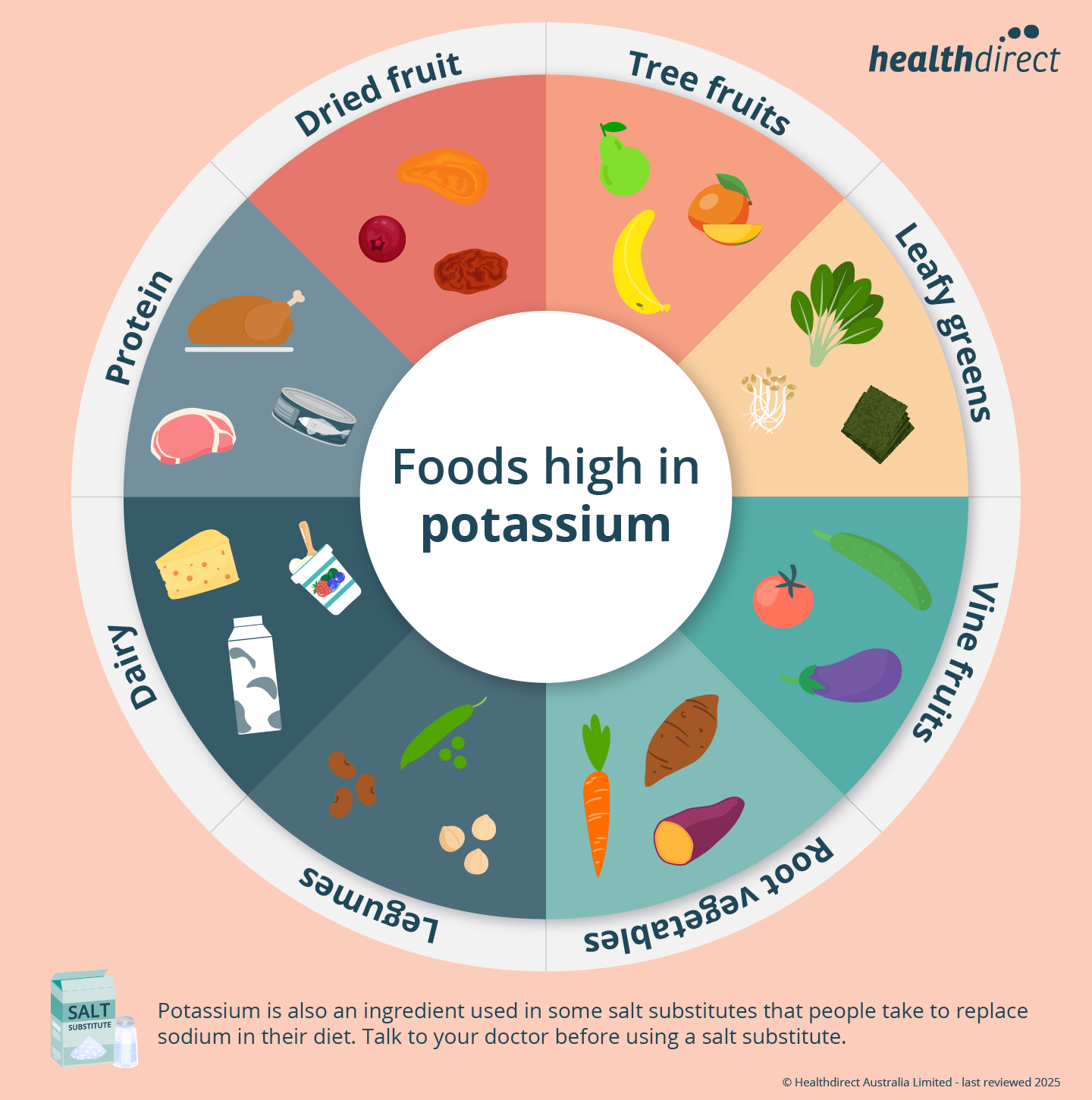Foods high in potassium
Key facts
- Potassium is a mineral that is essential for your body to function.
- A wide variety of fruits, vegetables, grains, dairy and meat products contain potassium.
- Most healthy people get enough potassium from their normal diet.
- If you are at risk of a potassium deficiency, such as taking a diuretic medicine, speak to your doctor about having your potassium levels checked.
- You should talk to your doctor before taking potassium supplements.
What is potassium?
Potassium is a mineral that is essential for all of your body's functions. It helps parts of your body to function, such as your:
It also helps move nutrients and waste into and out of your cells.
How much potassium do I need?
The amount of potassium you need depends on:
- your sex
- your age and life stage
- whether you have any medical conditions
Having too little or too much potassium in your body can affect your health. Most people get enough potassium from a balanced diet.
If you're concerned about your potassium levels, ask your doctor about getting a blood test.
You can read more about potassium and your health.
What foods are high in potassium?
Potassium is found in a wide variety of foods. It’s added as a food ingredient and found naturally in a range of plant and animal foods.
There is plenty of potassium in:
- reduced-salt packaged products
- meat, pork, chicken and fish
- fruit juices and milkshakes
- chocolate and coffee
- milk and yoghurt
Potassium is also found in:
- root vegetables such as potatoes and sweet potatoes
- vine fruits such as tomatoes, cucumbers, zucchini, eggplant and pumpkin
- dried fruits such as apricots
- leafy greens such as spinach
- tree fruits like mangoes and bananas
- legumes such as chickpeas, beans and peas
| Food | Serving size | Potassium content in milligrams (mg) |
|---|---|---|
| Mung beans | 1 cup | 938 mg |
| Potatoes (baked) | ½ medium | 583 mg |
| Banana (cavendish) | 1 medium | 519 mg |
| Spinich (baby, raw) | 1 cup | 454 mg |
| Apricot, dried | 30 grams | 453 mg |
| Salmon (cooked) | 100 grams | 380 mg |
| Milk (regular fat) | 1 cup | 377 mg |
| Pork, loin cutlet | 65 grams | 353 mg |
| Pumpkin, butternut (baked) | ½ cup | 332 mg |
| Chicken breast (roasted) | 80 grams | 256 mg |
| Tuna (canned) | 100 grams | 250 mg |
| Sweet potatoes (baked) | ½ medium | 229 mg |
| Chickpeas (canned) | 1 cup | 210 mg |
| Zucchini | ½ cup | 201 mg |
Potassium is also an ingredient used in some salt substitutes that people take to replace sodium in their diet. It’s important to talk to your doctor before using a salt substitute.
If you have kidney disease or take certain medicines, your potassium levels may be too high.

Should I take a potassium supplement?
Your potassium levels can become low. This is known as potassium deficiency or hypokalaemia.
There are different reasons why your potassium levels may become low, such as if you take diuretic medicines.
You can ask your doctor if you need to have your potassium levels checked. They will tell you if you need to take a potassium supplement.
Having too much potassium in your body (known as hyperkalaemia) can be dangerous. You should only take a potassium supplement under medical advice.
Infants under 1 year of age should get enough potassium from breastmilk, formula or food.
Do potassium supplements cause side effects?
If you think you or someone else is having a cardiac arrest, call triple zero (000) immediately and ask for an ambulance. In the meantime, start CPR and follow all instructions given by the triple zero (000) operator.
Taking potassium supplements can cause severe hyperkalaemia (high levels of potassium in your blood) especially if you have chronic kidney disease. This can cause gastrointestinal symptoms such as nausea, vomiting and abdominal pain. It can also cause problems with your heart like irregular heartbeats and cardiac arrest.
Always speak with your doctor before taking potassium supplements.
FIND A HEALTH SERVICE — The Service Finder can help you find doctors, pharmacies, hospitals and other health services.
ASK YOUR DOCTOR — Preparing for an appointment? Use the Question Builder for general tips on what to ask your GP or specialist.
Resources and support
Eat for Health has information and advice about healthy eating, including potassium.
Kidney Health Australia has information about keeping a healthy diet if you have chronic kidney disease. This advice includes how much potassium you should eat.
You can also call the healthdirect helpline on 1800 022 222 (known as NURSE-ON-CALL in Victoria). A registered nurse is available to speak with 24 hours a day, 7 days a week.
Learn more here about the development and quality assurance of healthdirect content.
Last reviewed: April 2025











